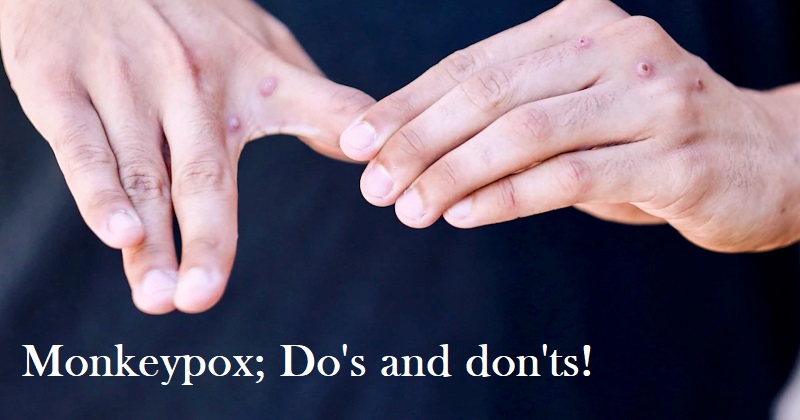
With rising cases of monkeypox in India, the Union health ministry has released a list of dos and don’ts to avoid contracting the disease. It underlined that anyone can catch the virus if they have had prolonged or repeated contact with an infected individual. Among the dos, the ministry advised isolating the infected person from others so that the disease does not spread.
The don’ts state that you should not share linen, bedding, clothing, or towels with people who have tested positive for the infection. The ministry advised against washing soiled linen or laundry from patients and non-infected people together, and to avoid public events even if you only have symptoms of the disease.’ People who have been infected with the virus, as well as suspected patients, should not be stigmatized. Also, disregard any rumour or misinformation ‘, it stated.
Symptoms include a rash, swollen lymph nodes, fever, headaches, body aches and profound weakness and are to be considered a ‘suspected case’ within 21 days of traveling to an affected country. A ‘probable case’ is a person meeting the case definition for a suspected case, clinically compatible illness and has an epidemiological link like face-to-face exposure. A case is considered laboratory confirmed for monkeypox virus (by detection of unique sequences of viral DNA either by polymerase chain reaction or PCR and/or sequencing).
In the guidelines, exposure is defined as having had one or more of the exposures — face-to-face exposure, direct physical contact, sexual contact or contact with contaminated materials. Cases can be prompted to identify contacts across the household, workplace, school/nursery, sexual contacts, healthcare, houses of worship, transportation, sports, social gatherings, and any other recalled interactions. Pre-school children may be excluded from day care, nursery, or other group settings for a period of 21 days. In case of occurrence of fever clinical/lab evaluation is warranted. Asymptomatic contacts should not donate blood, cells, tissue, organs or semen while they are under surveillance.
A government task force has been set up to examine emerging trends related to vaccination for the disease. Human-to-human transmission occurs primarily through large respiratory droplets generally requiring prolonged close contact, according to health ministry guidelines. Monkeypox can be transmitted by contact with bodily fluids of an infected person or through contact with the animal-to-human transmission. It can also be transmitted through direct contact with body fluids or lesions. The incubation period is usually from six to 13 days and the case fatality rate of monkeypox has historically ranged up to 11 per cent in the general population and higher among children.
Monkeypox is a viral zoonosis — a virus transmitted to humans from animals. Symptoms include fever, rash and swollen lymph nodes and may lead to a range of medical complications. It is a self-limited disease with symptoms lasting for two to four weeks. The World Health Organisation had recently declared monkeypox a global public health emergency of international concern.

Post Your Comments